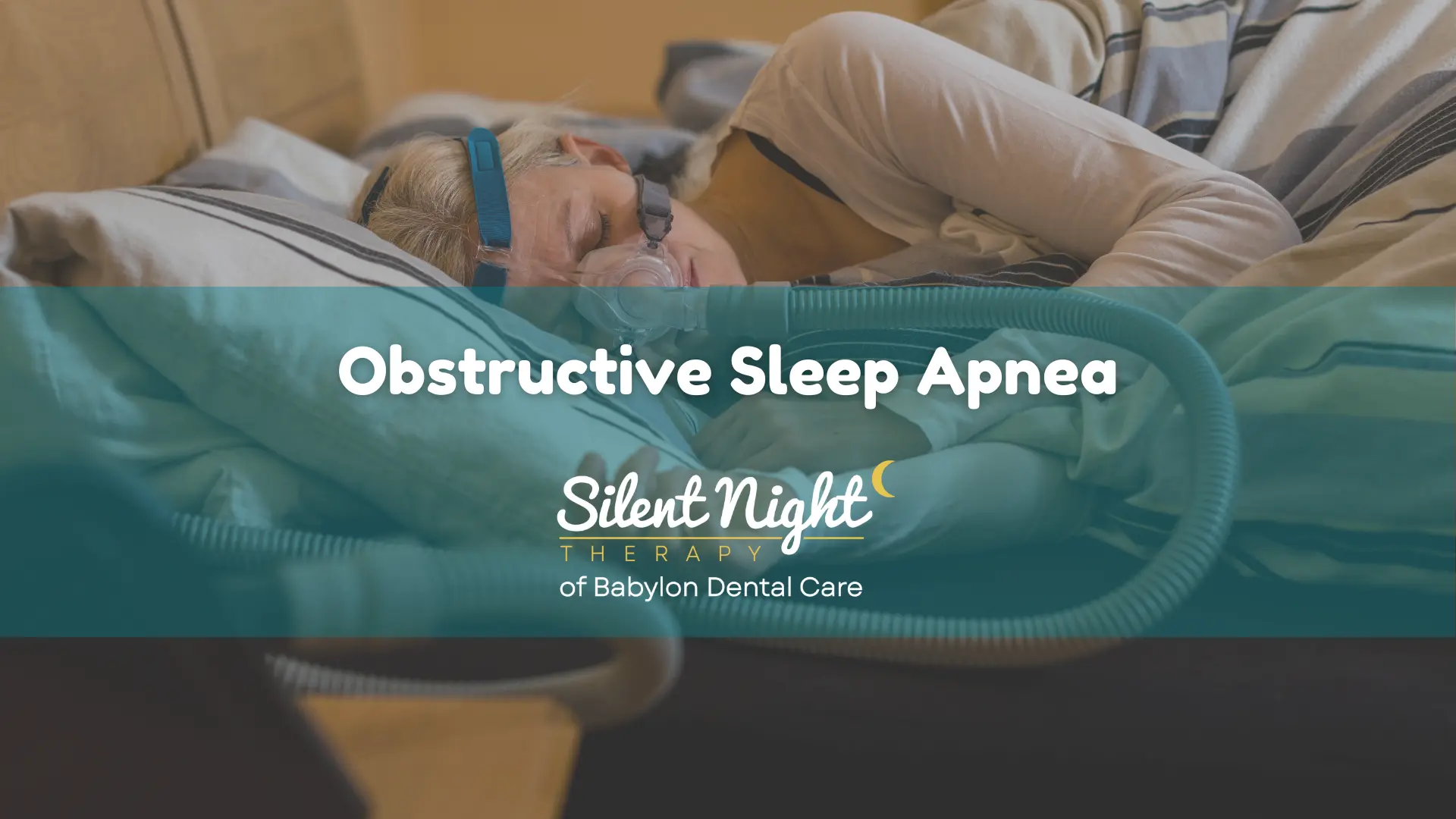
Obstructive sleep apnea is a common yet dangerous sleep issue that could impact your ability to breathe consistently during sleep. Patients may snore, wake up gasping, or experience debilitating fatigue during the day, affecting their sleep quality, heart health, and quality of life.
Are you struggling with obstructive sleep apnea in West Babylon or Patchogue, NY? Dr. Clifford Brown and the professionals at Silent Night Therapy offer innovative treatment options to help you reclaim the healthy, restful sleep you deserve. Try our 3-minute online evaluation, then contact us at (631) 983-2463 for a consultation and at-home test.
Dynamic Toc TestWhat is Obstructive Sleep Apnea?
Obstructive sleep apnea occurs when a blocked or narrowed upper airway causes hindered breathing at night. There are two common elements of obstructive sleep apnea:
- Apneas are periods of paused breathing, similar to when someone holds their breath. Your diaphragm doesn’t move during apnea periods, which can last up to a few minutes at a time before the obstruction shifts. There might be some airflow to your lungs during apnea, but not enough. This will drop your blood oxygen levels, elevating your risk of heart disease or other complications.
- Hypopnea – Hypopneas are periods of shallow or hindered breathing at night. While it’s less severe than apnea on paper, it can be just as detrimental to your sleep and life quality and decrease your blood oxygen levels.
Someone might have obstructive sleep apnea if they exhibit these signs:
- Fatigue during the day, not explained by anything else
- Snoring, sometimes with silent periods or gasps in between
- Restlessness
- Difficulty concentrating or remembering things
- Mood swings
- Headaches upon waking
- High blood pressure
- Decline in libido
You might not notice some signs of obstructive sleep apnea. If your case is mild, you may not even notice it at all. If you sleep in the same bed or room as your partner, they may alert you of signs they see or hear.
Diagnosing Obstructive Sleep Apnea
The first step in diagnosing obstructive sleep apnea is to determine your risk. You may be more likely to develop obstructive sleep apnea if:
- You have a family history of sleep apnea.
- You are obese.
- You have a large neck (greater than 16-17 inches, depending on your sex.)
- You are a smoker, or you have a history of smoking.
- You previously sustained an injury to your neck or head.
- You have a history of thyroid problems.
Once your provider has evaluated your symptoms and determined your risk profile, they’ll likely order a polysomnogram, sometimes called a “sleep study.” This painless, non-invasive exam involves using sensors to follow your heart and breathing patterns over a typical night’s rest. A final diagnosis is usually made when your doctor examines the study findings.
Treating Obstructive Sleep Apnea
Previously, the gold standard for treating obstructive sleep apnea was continuous positive airflow pressure or CPAP for short. CPAP devices use air through a mask to push obstructions out of the way and open your airway. However, many patients find them uncomfortable, bulky, and restrictive.
Today, CPAP is giving way to oral appliance therapy as a new first-line treatment for many people. An oral sleep appliance is worn in the mouth to help alleviate sleep apnea symptoms and snoring. It works by repositioning the jaw and tongue to keep the airway open. This is an effective and non-invasive treatment option for sleep apnea and snoring.
The Silent Night Therapy Approach
 At Silent Night Therapy, our approach is as innovative as the devices we provide. As a patient with us, you’ll go through the following steps:
At Silent Night Therapy, our approach is as innovative as the devices we provide. As a patient with us, you’ll go through the following steps:
- Consultation appointment – During this complimentary appointment, we’ll evaluate your symptoms and listen to what you’re looking for in a treatment.
- At-home sleep study – Patients must get the best rest possible for an accurate sleep study, which isn’t easy if they’re in a medical setting. Our team uses the Night Owl test, which you can take at home using simple sensors connected to your smartphone via Bluetooth.
- X-rays and impressions – If we determine you might be a candidate for oral appliances, we’ll take X-rays and 3D images of your jaw to ensure we get the best fit.
- Training – We’ll provide you with a crash course on how to use and care for your appliance.
- Follow-ups – At follow-up consultations, we’ll ensure your appliances are in good condition, making adjustments as necessary to keep delivering you the best results we can.
Contact a West Babylon and Patchogue, NY, Obstructive Sleep Apnea Expert
If you’re experiencing obstructive sleep apnea symptoms, don’t wait to find answers and protect your long-term health. Dr. Clifford Brown provides patients with the latest technology for comfort relief and a better night’s sleep. As a sleep apnea patient, he also aims to provide an empathetic listening ear, informed by his decades of experience as a family dentist. Contact our West Babylon or Patchogue offices at (631) 983-2463 for a free consultation.